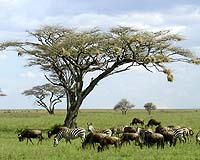 |
Juba, Sudan (AFP) Feb 5, 2011 A rebellion by former pro-Khartoum militiamen in south Sudan against giving up their heavy weapons sparked two days of clashes which killed 20 people in oil-producing Upper Nile state, a military spokesman said on Saturday. The fighting in Malakal, the state capital, close to the border with the north, killed 20 including two children and wounded at least 24, said Philip Aguer, spokesman for the former rebel Sudan People's Liberation Army (SPLA). "There was heavy fighting with mortars fired by both sides, but the clashes have now been brought under control," Aguer said. "Our forces in the SPLA, along with the United Nations peacekeepers, have succeeded in creating a buffer zone between the two sides and to bring the situation to an end." Upper Nile's information minister Peter Lam Both said fighting had also erupted in three other areas of the sensitive state on Saturday morning -- Paloich, Malut and Maban. "The fighting started this morning but is now over... We don't have any casualty figures but we're fearing the numbers are heavy," Lam told AFP. The fighting around Malakal airport was sparked on Thursday when loyalists of Gabriel Tang, who commanded a pro-Khartoum militia during the 1983-2005 civil war between north and south, objected to surrendering their heavy weaponry. The former militiamen are deployed alongside regular northern troops in so-called Joint Integrated Units (JIUs) with southern forces that patrol the town under the peace agreement that ended the civil war. In reality the units are far from integrated, and the component elements effectively operate as separate forces. The northern troops are shifting their equipment back home as the south gears up for its expected international recognition as an independent state in July following its overwhelming vote for secession in last month's landmark referendum. But the ex-militiamen, whose roots are in the south, want to keep hold of their units' weaponry and they have put up a ferocious resistance to its redeployment. A spokesman for Sudan's joint defence council, Ahmed Abdullah, said the reduction of troops and equipment had been agreed last Sunday, but that no southerners in the joint units had been ordered to redeploy in the north. He blamed the fighting in Malakal on Nuer tribesmen loyal to Tang. "The individuals who rebelled are sons of the Nuer tribe with old organisational links to the army fugitive General Gabriel Tang," Abdullah was quoted as saying by the semi-official Sudanese Media Centre. Tang gave up his own position in the northern army after accepting an offer of clemency from southern president Salva Kiir late last year, but many of his men remain in northern units. Saturday's fighting outside Malakal broke out for similar reasons to the earlier mutiny, the state information minister said, adding that the militiamen there were not necessarily Tang supporters. "The SAF (Sudanese armed forces -- the northern army) JIUs have men of southern as well as northern origin in them. Now with the northern section moving back with their equipment towards the border, the southerners are wanting to keep the artillery," Lam said. Six civilians and one SPLA soldier were killed in the crossfire in Malakal, as the southern force tried to intervene, the southern military spokesman said. Two of the dead were young children, Aguer added. Six regular northern troops and seven former militiamen were also killed in the fighting, he said. Two civilians and a total of 22 members of the northern force were wounded. Aguer said the southern army was now assisting in the redeployment of the heavy weapons. "We are now supporting the movement of the tanks back to the north," he said. Malakal was a key garrison town for the Khartoum government during the civil war and it still houses much heavy weaponry supplied to northern troops and their militia allies. The Joint Integrated Units deployed in sensitive areas such as Malakal are due to be phased out in July when the interim arrangements set down in the 2005 peace agreement come to an end.
Share This Article With Planet Earth
Related Links Africa News - Resources, Health, Food
 Road May Disrupt Migration And Ruin Serengeti
Road May Disrupt Migration And Ruin SerengetiGuelph, Canada (SPX) Feb 04, 2011 Building a highway through Serengeti National Park may devastate one of the world's last large-scale herd migrations and the region's ecosystem, according to new research by an international team of ecologists, including a University of Guelph professor. The study by John Fryxell, a Guelph integrative biology professor, and four other scientists from the United States and Canada appears in ... read more |
|
| The content herein, unless otherwise known to be public domain, are Copyright 1995-2010 - SpaceDaily. AFP and UPI Wire Stories are copyright Agence France-Presse and United Press International. ESA Portal Reports are copyright European Space Agency. All NASA sourced material is public domain. Additional copyrights may apply in whole or part to other bona fide parties. Advertising does not imply endorsement,agreement or approval of any opinions, statements or information provided by SpaceDaily on any Web page published or hosted by SpaceDaily. Privacy Statement |